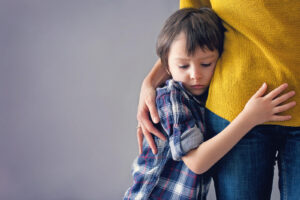As a parent, it’s natural to worry about your child, especially when they seem anxious or fearful. But how do you know when your child’s worries have crossed the line from normal childhood concerns to an anxiety disorder? Recognizing the signs and knowing how to help can make a huge difference in your child’s emotional well-being.
Understanding Anxiety in Children
It’s important to remember that all children experience anxiety at some point. It’s a normal response to stress or changes in their environment, such as starting a new school, meeting new people, or dealing with a challenging situation. Anxiety is a natural response to uncertainty and is an adaptive response to our survival. However, when anxiety becomes persistent, overwhelming, or interferes with their daily life, it could signal an anxiety disorder.
Common Signs of Anxiety Disorders in Children
Recognizing the difference between typical childhood worries and an anxiety disorder can be challenging. Here are some common signs that may indicate your child is dealing with more than just temporary anxiety:

1. Excessive Worrying
All kids worry at times, but children with anxiety disorders often worry excessively about a wide range of things. They may become overly concerned about school, friendships, health, or even seemingly minor issues. These worries are often out of proportion to the actual situation and can persist for weeks or months.
2. Physical Symptoms
Anxiety doesn’t just affect the mind—it can also cause physical symptoms. Children may frequently complain of headaches, stomachaches, or fatigue. You might notice them having difficulty sleeping, or they may feel restless, shaky, or sweaty. These physical symptoms often occur when there’s no other medical explanation.
3. Avoidance Behaviors
Children with anxiety disorders may go out of their way to avoid situations that trigger their fears. This might include avoiding school, social events, or other activities they once enjoyed. They may have trouble separating from their parents, refusing to attend play dates, or even asking to stay home from school often.
4. Irritability and Emotional Outbursts
Anxiety can make children feel overwhelmed, leading to irritability, frustration, or anger. If your child seems unusually moody or has frequent emotional outbursts, it could be due to underlying anxiety. These emotions are often a sign that your child is struggling to manage their fears and worries.
5. Perfectionism and Fear of Failure
Some anxious children develop a fear of making mistakes or falling short of expectations. They may become perfectionistic, spending excessive time on homework or constantly seeking reassurance that they’ve done things correctly. The fear of failing can make them avoid trying new things or taking risks.
6. Social Withdrawal
If your child suddenly becomes more withdrawn, avoids social interactions, or seems unusually shy, it could be a sign of social anxiety. Children with social anxiety often fear being judged, embarrassed, or rejected by their peers, which can lead to isolation or avoidance of social settings.
7. Reassurance-Seeking
Anxious children often need constant reassurance from parents, teachers, or friends. They may ask the same questions repeatedly or seek frequent validation that everything is okay. This can be a sign that your child is struggling to trust their ability to handle situations on their own.

Types of Anxiety Disorders in Children
If your child shows persistent signs of anxiety, it’s helpful to know the different types of anxiety disorders that can affect children:
– Generalized Anxiety Disorder (GAD): Characterized by excessive worry about various aspects of life, including school, family, and social interactions.
– Separation Anxiety Disorder: Fear of being separated from parents or caregivers, often leading to refusal to go to school or play dates.
– Social Anxiety Disorder: Intense fear of social situations, worrying about being embarrassed or judged by others.
– Specific Phobias: Extreme fear of specific objects or situations, such as animals, heights, or flying.
– Panic Disorder: Recurrent, unexpected panic attacks, often accompanied by fear of having more attacks in the future.
How to Help Your Child with Anxiety
If you suspect your child may have an anxiety disorder, there are several steps you can take to support them:
1. Listen and Validate Their Feelings
The first and most important thing you can do is listen to your child and validate their feelings. Avoid dismissing their fears with statements like, “It’s no big deal” or “You’re overreacting.” Instead, acknowledge that their feelings are real and understandable. Saying things like, “I can see that this is really hard for you” can help them feel heard and supported.
2. Encourage Gradual Exposure
One effective way to help children manage anxiety is through gradual exposure to the things that scare them. Start small, and slowly build up to more challenging situations. For example, if your child is afraid of attending school, begin by having them go to school for a few hours, and then as they get more comfortable expand the time they attend school.
3. Teach Coping Skills
Help your child develop coping skills to manage their anxiety. This can include teaching them deep breathing exercises, mindfulness techniques, or progressive muscle relaxation. Breathing exercises, like “belly breathing,” can help calm their body and mind when they feel anxious.
4. Model Calm Behavior and Language
Children look to their parents for cues on how to respond to stress. By staying calm and composed when your child is anxious, you show them that they don’t need to panic.
Avoid reacting with frustration or anger, even if their anxiety seems irrational. Instead, approach the situation with empathy and patience. Also, be mindful of the things you say to your children that can increase their anxiety. “Hurry up—we are going to be late” or “Be careful or you will hurt yourself” are common phrases that can increase anxiety, especially in sensitive children.
5. Limit Reassurance
While it’s natural to want to reassure your child when they’re anxious, too much reassurance can reinforce their fears. Try to gently encourage your child to find solutions on their own or talk through their fears with you instead of constantly seeking reassurance.
6. Create a Safe and Supportive Environment
Make sure your child knows that home is a safe space where they can talk about their worries without judgment. A supportive environment can go a long way in helping them feel secure and open to working on their anxiety.
7. Work with a Child Therapist
If your child’s anxiety is affecting their daily life, school performance, or relationships, it may be time to seek professional help. A child therapist can work with your child to identify triggers, develop coping strategies, and provide support through therapy. At WHCC we have many child therapists that specialize in play-based cognitive behavioral therapy (CBT) which is often effective in helping children manage anxiety.

When to Seek Professional Help
If your child’s anxiety has become chronic, disruptive, or is causing significant distress, seeking help from a mental health professional is essential. A child therapist can assess your child’s symptoms, provide a diagnosis if needed, and develop a treatment plan tailored to their specific needs.
Helping Your Child Build Resilience: Recognizing and Managing Childhood Anxiety
Anxiety is a common issue among children, but it doesn’t have to control their lives. By recognizing the signs of an anxiety disorder and providing the right support, you can help your child navigate their fears and develop the skills to manage them. Remember, it’s not about eliminating anxiety altogether—it’s about helping your child build resilience, confidence, and the ability to cope with life’s challenges.
Take the First Step Toward Helping Your Child Thrive
If your child’s anxiety is impacting their daily life, seeking professional support can make all the difference. At WHCC, our child therapists are here to provide specialized care and help your child build the skills they need to manage their fears. Contact us to schedule an appointment and give your child the tools to face life’s challenges with confidence and resilience. Together, we can support their emotional well-being.
- Contact us here by filling out this form.
- Learn more about us.
- Watch your child thrive!
Other Services at WHCC
In addition to child therapy, WHCC offers a wide range of services to support the entire family. Our team provides teen therapy to help adolescents navigate emotional challenges, and adult therapy to address personal growth, mental health, and well-being. We also specialize in parent coaching, offering tailored strategies to support parents in fostering healthy relationships with their children. For couples, we provide marriage or relationship counseling to strengthen connections and improve communication. Our trauma therapy helps individuals heal from past experiences, while LENS neurofeedback offers a cutting-edge approach to managing anxiety, ADHD, and more.

